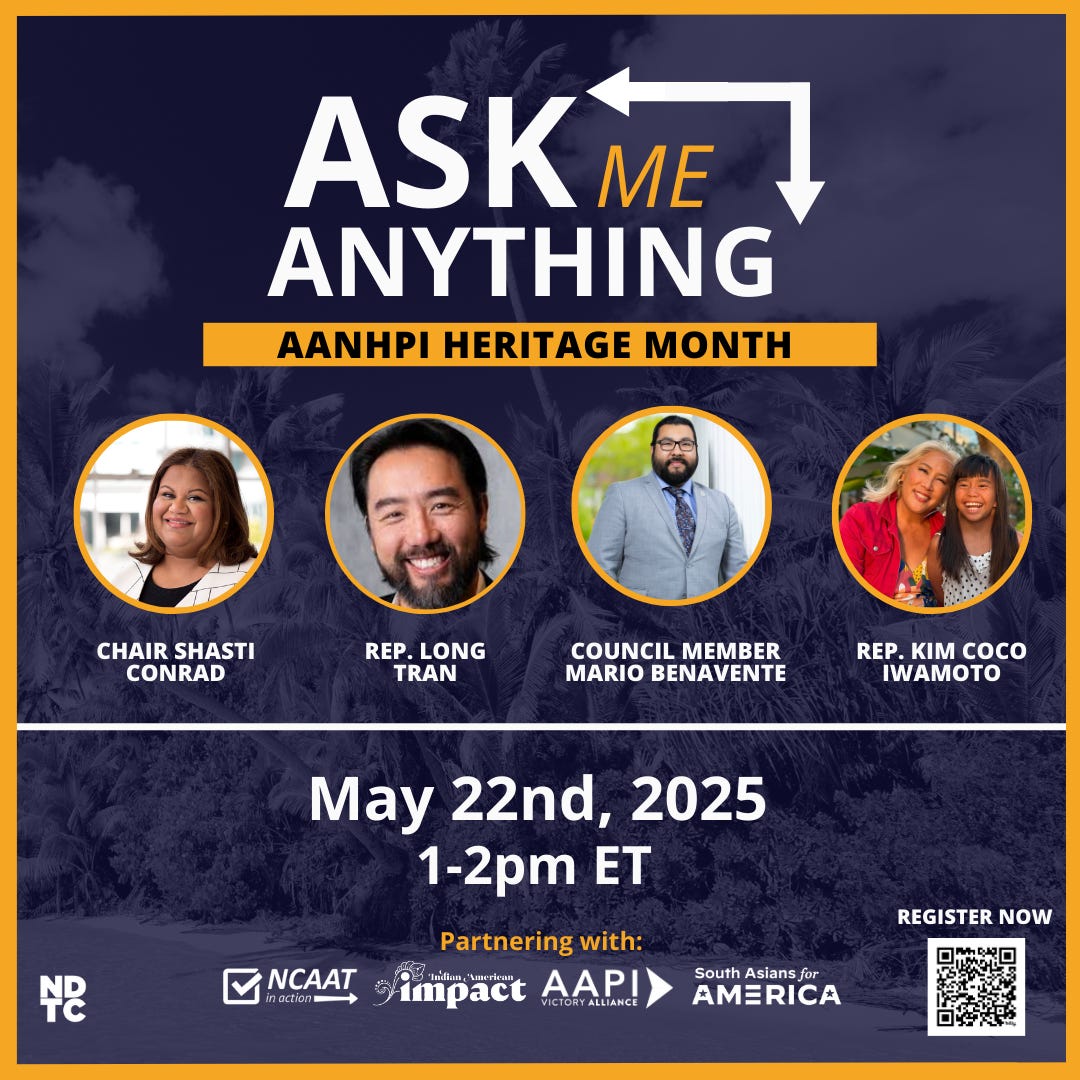Why Representation Matters
Representation matters, and we need more voices at the table to represent us all for a stronger democracy.
It’s AANHPI heritage month at NDTC, and we have some great programming happening. We’re also going to mark Pride Month next month. In fact, we mark, recognize, and celebrate many such heritage months through the year.
Invariably, we’ll get a “but why?” Often those emails are, shall we say, not polite. To them we, also invariably say, please learn to spell. But we digress.
TLDR
For the genuinely curious ones, who are asking in good faith, here is the short answer: We do this at NDTC because representation matters, and we need more voices at the table to represent us all for a stronger democracy.
The Longer Version
The longer version is that as an organization founded to train any Democrat who wants to run, reduce barriers to running, and build the next generation of Democratic leadership, NDTC believes in building a stronger democracy that serves all voters and doesn’t leave entire sections of the country behind. That makes it harder to pass harmful legislation because a member of that community is at the table and either humanizes the experience to other members of some committee, or is simply present enough to push back.
This is why we not only mark several heritage months in our programming, but also specifically seek out experts in the field, and reach out to audiences with tailored trainings for those who may not automatically see themselves represented in office, or know where to start. Especially if they’re from less represented or marginalized communities.
Why Representation Matters
We’re already seeing what happens when elected officials aren’t representative of voters. The 119th Congress is more diverse, and there were certainly a lot of firsts – the first transgender representative, the first time two African American women are serving simultaneously as Senators, the first Korean American Senator, and more. But it’s a drop in the bucket considering the wider picture of what American voters look like, and still far from representative of how they experience life.
Here are just a couple of important examples: Female representation – still less than a third of lawmakers, with Democrats far outnumbering Republicans. You have to wonder how different things might be – for equal rights, privacy laws, and funding for a host of things – if that changed. Also, as has been noted, the average age of the House is 57, and the Senate 64. The operative word here is “average.”
Being The First
Representation is also a self-fulfilling prophecy. If more people at the table look like you, you automatically belong – and so do the issues you bring to the conversation, with more ease. If people in the halls of power look like you, you can see yourself walking a known path in their shoes. The very fact that these leaders are at the table is often a huge win in dispelling stereotypes.
Conversely, if no one at the table looks like you or shares your life experience, it can be hard to imagine yourself as an elected official. And yes, you can be your own cheerleader if you want, but it’s that much harder to know what that end goal looks like when you’re a “first.” Being a trailblazer is an amazing story to tell – after you’ve made it. While you’re navigating that uncharted path though, it can be lonely. And there is the other side of the self-fulfilling prophecy – you never see someone like you on the ballot, so you never imagine that path for yourself, and so you never run, your community does not have a voice, and therefore lacks representation.
Representation Matters, Period
The democracy that lacks a diversity of voices, experiences, and representation at the table does itself no favors, and actively weakens itself. That’s why NDTC's core mission remains to lower the barriers of entry, train any Democrat who wants to run, and build the next generation of inclusive and lasting political, Democratic, power.
We are halfway through AANHPI Heritage Month with an AMA coming up where trailblazers, who broke barriers in running for office and are instrumental in building diverse Democratic leadership, will share their experiences.
The panel includes Hawaii State Rep. Iwamoto (District 25), City Council Member Benavente (District 3, Fayetteville, North Carolina), Georgia State Rep. Tran (District 80), and Washington Democratic Party Chair Conrad. This amazing panel will provide a unique lens into how candidates – from a community that is far from a monolith – can challenge voter perceptions and expectations, and still build connections with communities on the issues that matter to everyone.
Check out this special conversation, and more in June when we celebrate Pride Month!
Thank you for reading our latest Substack!
Connect with us everywhere!
Instagram: https://www.instagram.com/traindems/
Facebook: https://www.facebook.com/traindems/
Threads: https://www.threads.net/@traindems
Bluesky: https://bsky.app/profile/traindems.bsky.social
Linkedin: https://www.linkedin.com/company/traindems
Twitter: https://x.com/TrainDems



